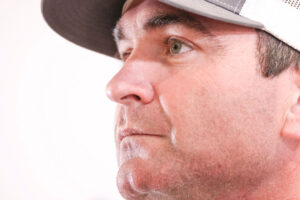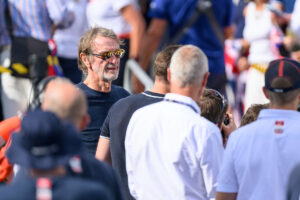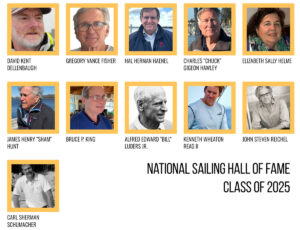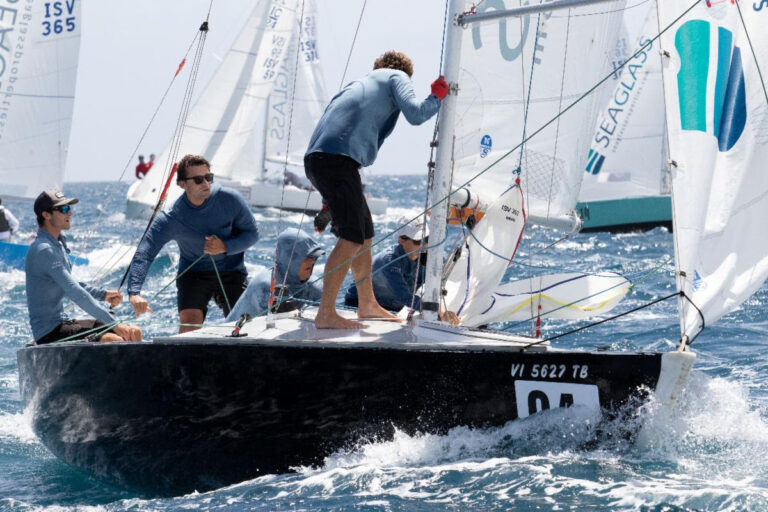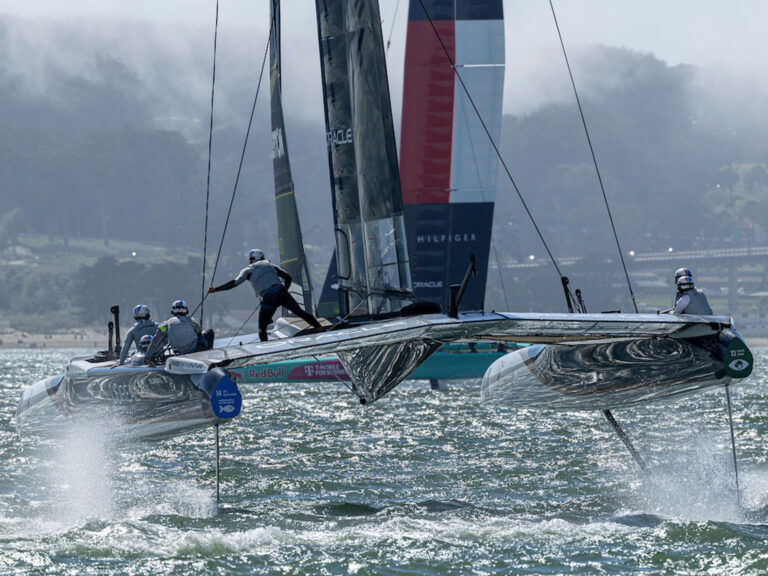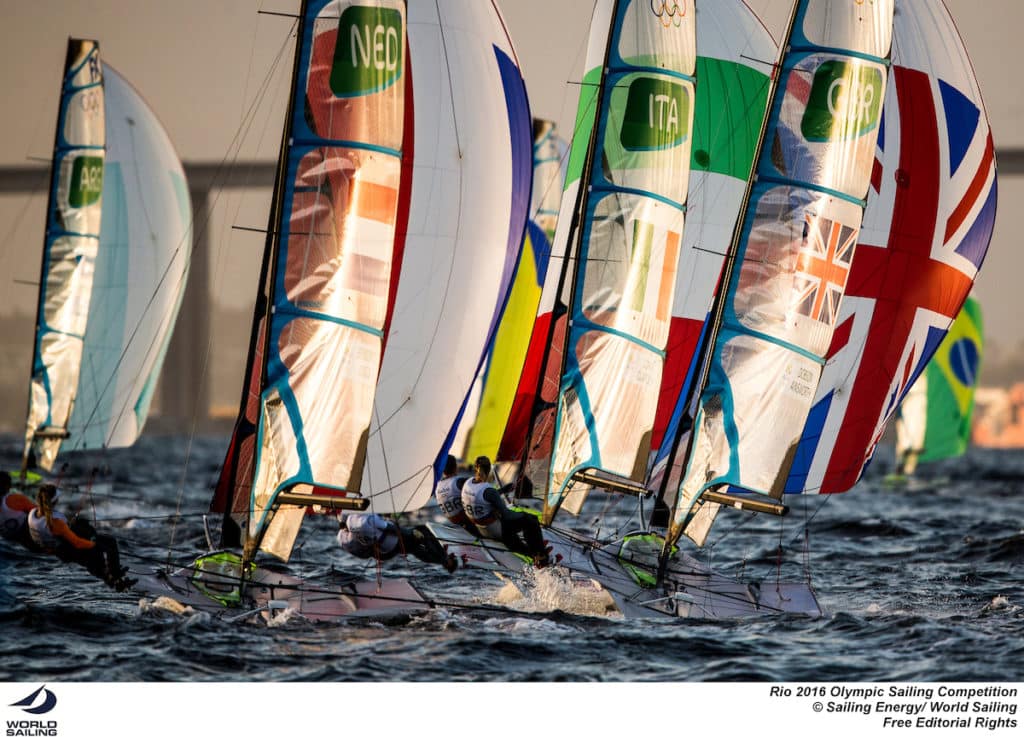
The Rio 2016 Olympic Sailing Competition
On the track at the Olympic stadium, Ethiopian runner Almaz Ayana ran 10,000m to a gold medal at world-record speed. An hour away, up the coast of Rio de Janeiro, another speedster was getting to work. Well, two: Peter Burling and Blair Tuke, New Zealand’s 49er kings, were zipping up the Pao de Acucar course, with seemingly unmatchable in boatspeed.
Competitors remark time and again on the Kiwi’s boatspeed. They consistently posted the highest speed in the fleet, save for the first beats of each race. Burling and Tuke do struggle with starts, but their ability to catch and pass anyone who happens to start in front of them is undeniable.
When asked how they consistently sailed a quarter to half a knot faster than their competition on the same tack, Burling said that their key is momentum, to get the skiff going fast and flat and ride the speed from there. “We kept putting the boat in the good breeze,” says Burling. “That was the difference today, who could get into the puff, put the bow down and go fast.
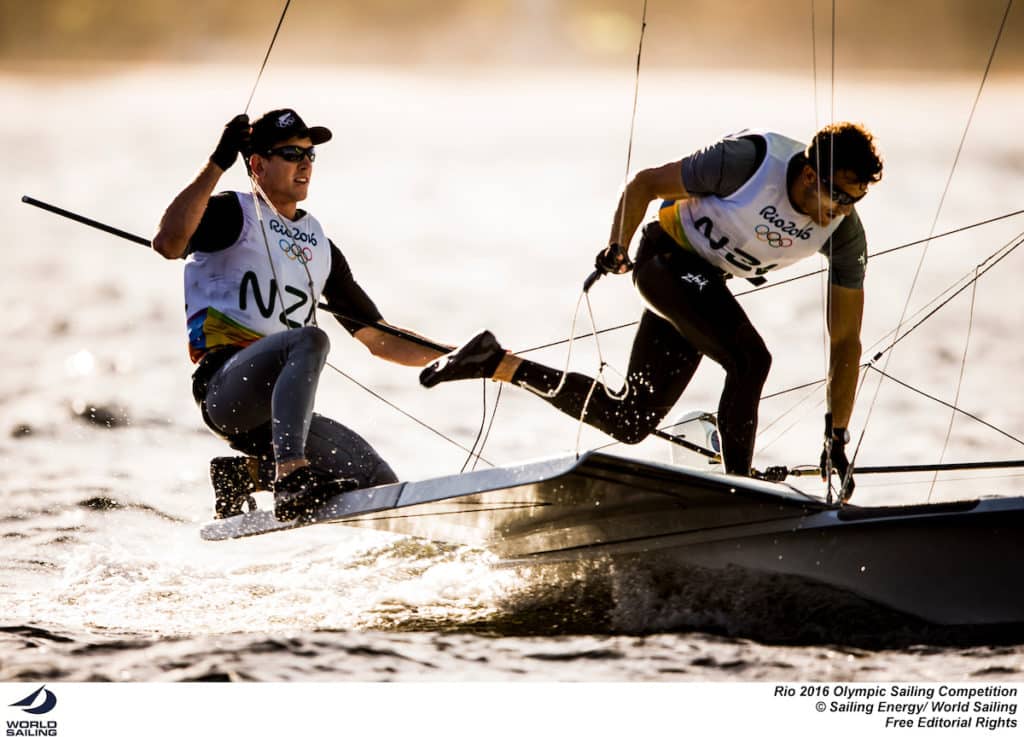
The Rio 2016 Olympic Sailing Competition
They were nearly beaten in the Olympic opening race when they called a shift wrong in the second beat, allowing the Danish team, Jonas Warrer and Christian Peter Lubeck, to sneak past them. The triumph for the Danes was short-lived, as they failed to go through the final gate, had to douse their kite and retrace their steps, and in the process lost seven boats, including Burling and Tuke. The New Zealand team blasted by and took the win by 25 seconds over the Japanese team, Yukio Makino and Kenji Takahashi. In the second race, they increased their margin, beating Ireland’s Ryan Seaton and Matthew Mcgovern by 42 seconds.
The Kiwis walked away from the day with two bullets, an excellent start to the first of twelve scheduled races. The fleet is now behind in races as there were three scheduled for today, but a postponement made it impossible to get a third start before sunset. It’s unlikely the missed race will be made up, as according to the sailing instructions there need only to be six races in the class prior to the medal race. The 49ers have three more days of scheduled racing before the medal race.
Burling and Tuke’s biggest potential rivals, Australia’s Nathan Outteridge and Iain Jensen, struggled. “We certainly didn’t lose the event, but we haven’t set the world on fire yet,” says Outteridge. “Both races, we missed the best spots and we were in the pack. We were never able to get back up into those lead groups. Our strategy was not to risk much on the first day, and those races required a bit of risk at times.”
It’s still early days for the 49er, but there’s no denying the intimidation factor that Burling and Tuke now have on their side after two wins. They can only hope to emulate the performance that the Netherland’s Dorian Van Rijsselberghe put on on the RS:X course. Pending any protests or penalties, and his completion of the medal race in any place, Van Rijsselberghe has secured his second consecutive gold medal in the RS:X. Right behind him is Great Britain’s Nick Dempsey who, under the same circumstances as Van Rijsselberghe, will get the silver medal.
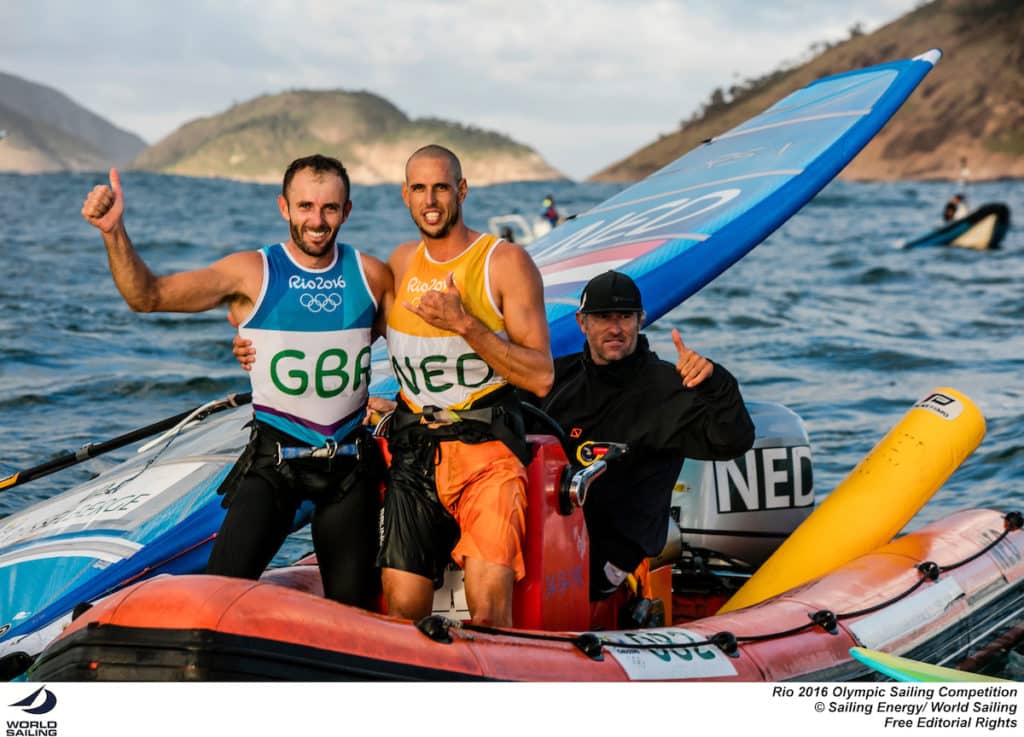
The Rio 2016 Olympic Sailing Competition
With seven bullets over twelve races, Van Rijsselberghe’s worst result in the preliminary races was a sixth. Dempsey won three races. Most of the RS:X races were in light air and shifty breeze, making tactics the name of the game. “It’s not a matter of luck,” says Van Rijsselberghe of his impressive results. “It’s a matter of seeing the conditions the best and taking the chance to go for it.” The bronze medal in the fleet is still undecided, as are all medals in the women’s RS:X fleet. Both medal races will be contested on Sunday.
For the women’s skiff, today was not only their first race but their Olympic debut. The Canadians, Erin Rafuse and Danielle Boyd, came out on top. “These conditions are right in our wheelhouse,” says Rafuse. “We know we can throw the boat wherever we want. This is definitely our best start to a regatta.”
The Lasers and Radials had their second to last day of preliminary racing, but in both classes there are no safe bets for medals yet. Denmark’s Anne-Marie Rindom has secured the lead in the Radials with her consistent high-fleet finishes, but London gold medalist Lily Xu, London silver medalist Marit Bouwmeester and Ireland’s Annalise Murphy are within striking distance. London bronze medallist and fleet favorite, Evi Van Acker, from Belgium has struggled, due to what her coaches say is a gastrointestinal illness. Responses for comment were not returned, but a team representative did elude to pollution as a possible cause of Van Acker’s illness in a Reuters report.
In the Laser fleet, Croatia’s Tonci Stipanović maintained his lead, but just, over Brazil’s Robert Scheidt who made an incredible comeback in the first race of the day, climbing from 31st to 4th. Scheidt is looking to break the record for most Olympic sailing medals won by an individual, and with two races to go until the medal race, he’s given himself a fair shot. He currently has five, tied with countryman Torben Grael and Great Britain’s Ben Ainsle.
On the 470 courses, favorites Sime Fantela and Igor Marenic maintained their lead, but only just. Australia’s Mat Belcher and Will Ryan are only two points behind, but with a comfortable lead on the rest of the fleet. On the women’s side, New Zealand’s Jo Aleh and Polly Powrie lost their hold of the lead to Hannah Mills and Saskia Clark, from Great Britain. Aleh and Powrie now sit in 6th.
The Finn and Nacra sailors enjoyed a reserve day off.
World Sailing’s results website seems to have worked out it’s kinks. Full results are available at sailing.org.

